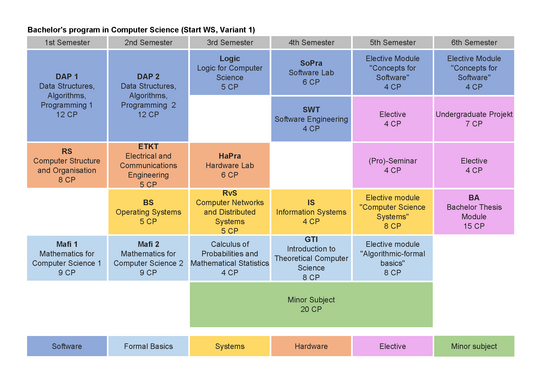Bachelor of Computer Science
In the foundation-oriented Bachelor's degree course in Computer Science, you will acquire solid methodological knowledge that you can apply in the long term. In the first semesters, you will acquire important knowledge and skills that form the basis for the following courses and a successful professional life.
The Bachelor's degree course in Computer Science is a full-time, on-campus course with a standard period of study of six semesters (three years) and leads to a Bachelor of Science (B.Sc.) degree. It starts in the winter and summer semesters.
The course language is usually German. The following courses are (also) offered in English.
Directly to the application in the TU Dortmund University campus portal
Below is a sample study plan with alternative text for Sreenreader at the start of the winter semester with its various modules.

Here you can download the study plan, a sample study plan for the summer semester and other study plans.
In the Software Cycle courses, you will learn how to develop software. The spectrum ranges from creating small programs and investigating the efficiency of certain algorithms to developing larger projects in a team.
You will learn about important computer science systems: Operating systems, computer networks, distributed systems and information systems (databases). They are part of every computer scientist's toolkit.
Many problems cannot be solved without an understanding of computer architecture, electrical engineering and communications engineering, which you will learn in the hardware cycle. In the hardware practical course, you will apply this knowledge to the construction of robots, among other things.
Computer science uses formal methods, which you learn in the mathematics and theory courses, to analyze and efficiently solve practical problems.
The Bachelor's degree course in Computer Science offers you a maximum of options. This is ensured by more than 20 university lecturers and their staff. In the proseminar, you will learn about scientific work on a topic that particularly interests you. In the specialist project, you will be given challenging tasks that will enable you to apply what you have learned so far in a team. This will prepare you for a successful Bachelor's thesis.
You earn credit points for one of the following alternatives with one or two modules with a total of exactly 8 credit points, which must be completed with graded module examinations:
- two modules from the modules of the elective area described in the module handbook or
- one (further) module from the module catalogs "Computer Science Systems" or "Algorithmic-Formal Foundations" of the compulsory elective area (in accordance with Annex A Para. 3 BPO Computer Science) or
- one module from the modules of the elective area described in the module handbook and one (further) module from the module catalog "Concepts for Software" of the elective area (in accordance with Annex A Para. 3 BPO Computer Science)
As a computer scientist, you will work in an interdisciplinary way. You can choose the minor subject that prepares you for this according to your interests, e.g. electrical engineering, logistics, mechanical engineering, mathematics, philosophy, physics, rehabilitation technology, statistics, theoretical medicine, economics or an individual minor subject that meets your expectations.
You will not only apply the knowledge gained in lectures in practice groups, but also in the internships integrated into the curriculum. In the software internship, you will work on challenging software projects in groups to gain valuable programming experience and skills such as teamwork and project management. The specialist project also involves challenging tasks that are worked on in a group.

![[Translate to English:] [Translate to English:]](/storages/zentraler_bilderpool/_processed_/d/f/csm_Informatik_275ba5e5fc.jpg)

![[Translate to English:] [Translate to English:]](/storages/zentraler_bilderpool/_processed_/1/b/csm_Figuren-nachdenklich_e2435967dd.jpg)
![[Translate to English:] [Translate to English:]](/storages/cs/_processed_/6/f/csm_teamwork1_e113f5f13b.png)
![[Translate to English:] [Translate to English:]](/storages/cs/_processed_/e/1/csm_header_ee496f74bf.png)